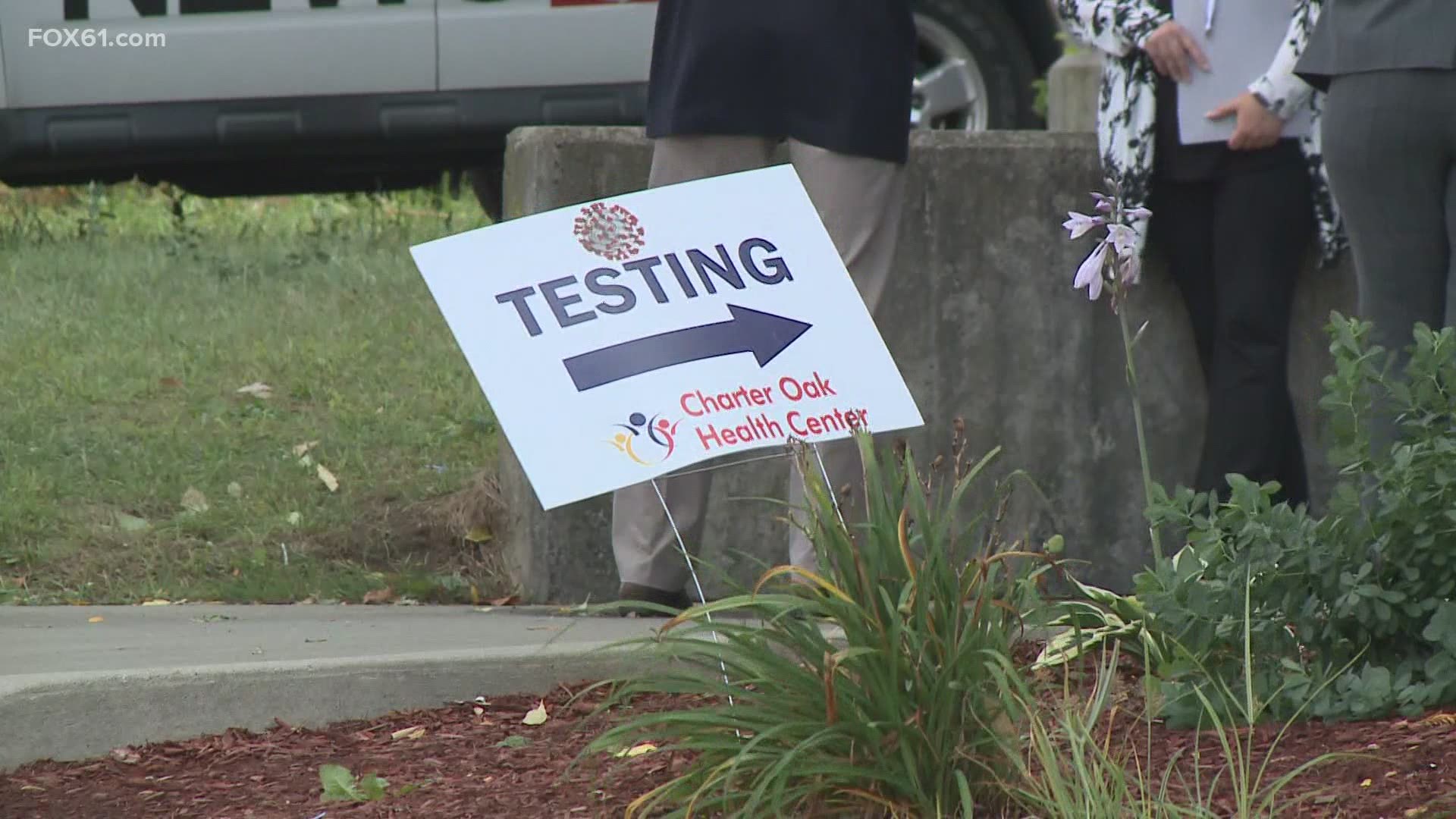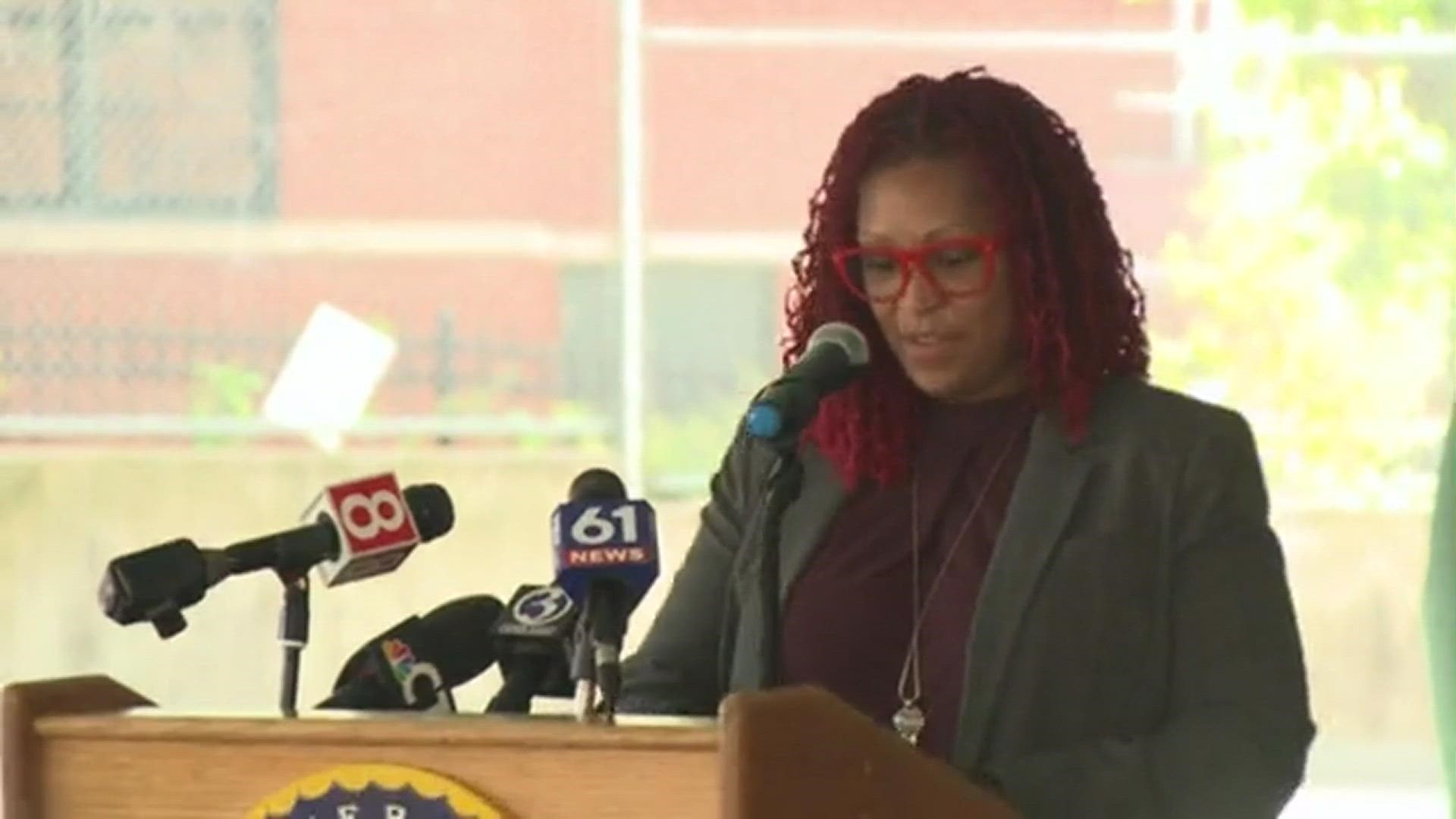HARTFORD, Conn. — Governor Ned Lamont held a news conference Wednesday afternoon to announce new community resources to further help Connecticut in its efforts to mitigate the spread of coronavirus.
The new resources will support those who need to isolate or self-quarantine due to COVID-19, officials said. They will help by ensuring that those infected or potentially exposed can stay home and avoid workplaces, schools, and gatherings.
Lamont spoke at 1 p.m. from the COVID-19 testing area at the Charter Oak Health Center on Grand Street and was joined by Lt. Governor Susan Bysiewicz, Public Health Acting Commissioner Dr. Deidre Gifford, Aging and Disability Services Commissioner Amy Porter, Mayor Luke Bronin, and Charter Oak Health Center CEO Nichelle Mullins.
Programs and services include:
- The Community Resource Coordinator (CRC) program: This public-private partnership draws on the strengths and connections of community based organizations and leverages state, federal, local and philanthropic contributions. CRCs will be responsible for working hand-in-hand with the contact tracing team, providers and service organizations to ensure that individuals have access to food, housing, and income they need to stay at home. The state has partnered with five regional community based organizations to run this program, and hire CRCs locally who know their communities – and can ensure individuals get access to what they need quickly.
- COVID kits for those who need to monitor their symptoms: COVID kits with needed supplies like thermometers, pulse oximeters, and masks will be available through CRCs for those in need who are asked to self-isolate or quarantine.
- Housing support: The state is dedicating $220,000 new dollars each month to short-term hotel options for those who can’t safely self-isolate or quarantine at home.
- Expansion of 4-CT Cash Cards: 4-CT allocated a total of $108,170 over the next five months to cash cards that can support the basic expenses of those who may need to miss work due to self-isolation or quarantine, and may not be eligible for unemployment insurance.
- Food assistance: With the support of 2-1-1 and local community teams, CRCs will help connect those in need to local food pantries and delivery services in their community.
“These are incredible state-local and public-private partnerships that include the much needed expertise from people in our communities providing services to those who need them every day,” Governor Lamont said.
Lamont believes that such a partnership and creative thinking is why Connecticut has been able to flatten the curve and lead the nation in COVID-19 response efforts.
"Throughout this pandemic, we haven’t lost sight of the fact that we need to take care of those who need it most. I want to thank all of the local organizations that have been supporting families with food, housing, and other support throughout this fight." the governor continued.
“Staying home while you’re waiting for a COVID-19 test result if you feel sick or may have been exposed is incredibly important to slowing the spread of virus, and can save lives,” Acting Public Health Commissioner Dr. Deidre Gifford said. “Investing in programs like these is a priority for our state because we know that if our residents have the ability to stay home when they need to, that work places will be safer, families will be safer, and it will be safer for all of us to continue the process of reopening our state.”
Earlier Wednesday, Gov. Lamont also announced that he will soon sign an executive order that will extend to January 1, 2021 a residential eviction moratorium protecting tenants who were current on their rent at the beginning of the pandemic and have paid at least a portion of their rent since.
Lamont said in a statement:
“Public health experts at the CDC have determined that supporting renters and landlords during this public health crisis is critical to controlling the spread of COVID-19. I’m trying to get people back to work and children back to school, and having a home you can call your own is a critical foundation for making that happen. Tenants who can pay their rent on time should do so, and landlords and tenants should work together to develop reasonable payment plans for these extraordinary circumstances. I thank Connecticut’s Congressional delegation for their support of legislation to provide further assistance to our communities, including $59 billion dollars for housing assistance in the revised HEROES Act proposal. It’s long past time for Republicans to stop cruelly ignoring the pain American families are facing and start supporting funding for these commonsense emergency programs.”
Additionally, Gov. Lamont is doubling funding for the previously announced Temporary Rental Housing Assistance Program (TRHAP) for Connecticut residents impacted by COVID-19 from $20 million to $40 million.
According to a release, the program provides up to $4,000 to landlords on behalf of approved tenant applicants.
The funding is made possible by the CARES Act’s Coronavirus Relief Fund. Locally, it is administered by the Connecticut Department of Housing in partnership with the Connecticut Housing Finance Authority (CHFA) and 11 housing counseling agencies across the state.
“Since the Temporary Housing Rental Assistance Program went live on July 15, we’ve received more than seven thousand submissions,” Connecticut Housing Commissioner Seila Mosquera-Bruno said. “We paused intake because the program was slow. This allowed us to redesign it and increase staff capacity in anticipation of additional funding. I’ve always maintained to stakeholders that we are evaluating the program on an ongoing basis. The revisions that we’ve identified are a direct result of those evaluations. The increase in funding reflects Governor Lamont’s commitment to help those families that have been affected by the pandemic and are in need of financial assistance to pay their rents.
On Tuesday, Gov. Lamont reported that Connecticut's COVID-19 positivity rate and current hospitalizations have increased.
In the latest coronavirus statistics for the state, the infection rate landed at 1.75 percent. In comparison, over the weekend of Septemeber 25-27, the positivity rate was 1.08 percent.
10,380 tests were administered and 182 of them came back positive.
Current hospitalizations also increased by 17 people, Gov. Lamont reported. Connecticut now has 92 patients being treated for COVID-19, the highest number of patients in weeks.
There were two more COVID-19 deaths reported, bringing Connecticut's death toll to 4,505 people. Hartford County has the most COVID-19 related confirmed deaths with 1,114 people.


